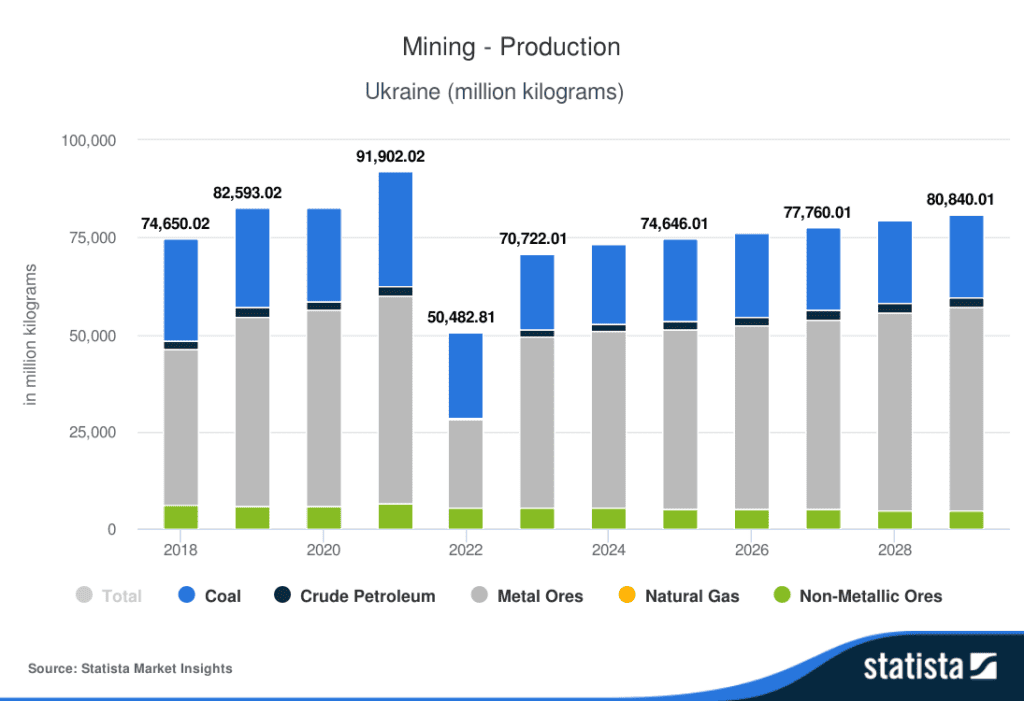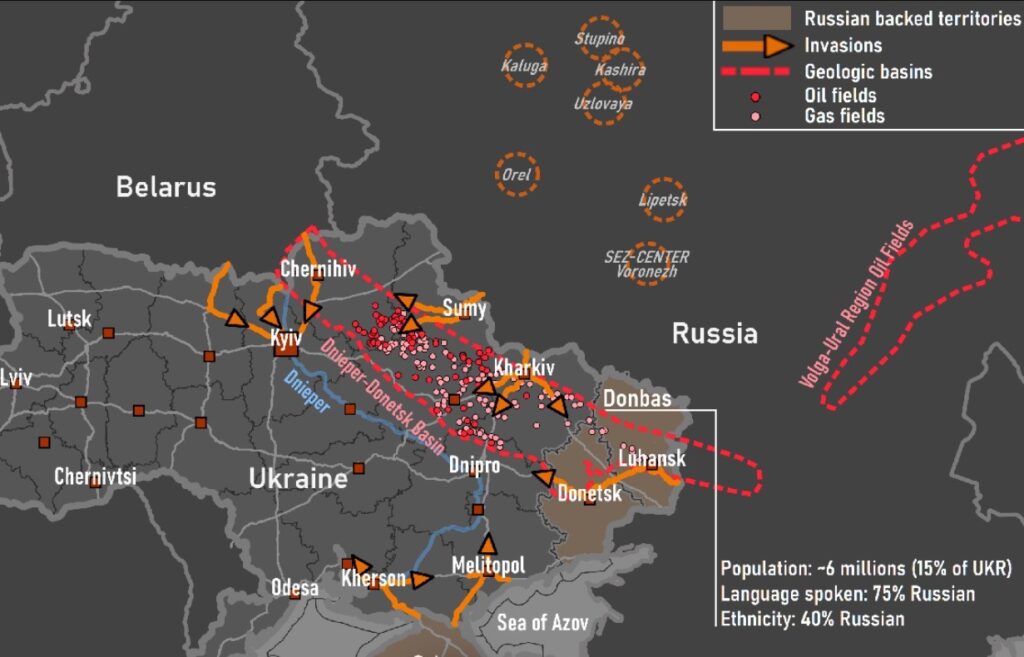
The strategic importance of Ukraine’s critical materials cannot be overstated. These resources are crucial for industries such as defense, high-tech, aerospace, and green energy. Global demand for essential minerals is expected to grow rapidly, driven by the shift towards electric vehicles and renewable energy technologies. Ukraine’s ability to provide these minerals is vital for nations aiming to diversify their supply chains and lessen reliance on non-democratic countries like China, Russia, Iran, and other non-democratic regimes.
Geopolitical challenges, including the Russian invasion of Ukraine, China-US competition, and the escalation in the Middle East, significantly influence the global supply chain, especially for critical raw materials vital to traditional industries, defense, high-tech sectors, aerospace, and green energy.
Democracies rely on essential critical raw materials such as nickel, lithium, and aluminum, and the market for critical minerals has doubled to over $320 billion in the last five years and is foreseen to double again in the next five.
Despite the ongoing war, Ukraine has significant potential to become a major global supplier of essential resources, including vital raw materials critical for prominent industries. With vast reserves of minerals, Ukraine can significantly contribute to the global supply chain for many, if not all, of them.

Figure 1. Mining – Ukraine | Statista Market Forecast
The disruption caused by the Russian aggression and competing suppliers such as China has highlighted the need for resilient and diversified supply chains. This has led the European Union and the United States to develop strategies aimed at reducing reliance on non-democratic regimes. Utilizing Ukraine’s resources can enhance these initiatives by aiding Europe’s transition to green energy and supporting countries recovery after the war.

Figure 1. Mining – Ukraine | Statista Market Forecast
Ukraine: A Key Source for Rare Earth Metals. Ukraine, with its diverse geological landscape, is a global powerhouse in mineral resources, holding approximately 5% of the world’s total. The country possesses around 20,000 natural deposits spanning 116 types. Before the full-scale Russian invasion, 15% of these deposits, including 147 metallic and 4,676 non-metallic ore deposits, were actively exploited.
Ukraine emerges as a key potential supplier of rare earth metals such as titanium, lithium, beryllium, manganese, gallium, uranium, zirconium, graphite, apatite, fluorite, and nickel. The nation boasts the largest titanium reserves in Europe (7% of global reserves) and is one of the few countries mining titanium ores, crucial for industries like aerospace, medicine, automotive, and marine.
Before February 2022, Ukraine was a significant titanium supplier to the military sector. It also holds one of Europe’s largest confirmed lithium reserves (estimated at 500,000 tons), vital for batteries, ceramics, and glass. Ukraine is the world’s 5th largest gallium producer, essential for semiconductors and LEDs, and has been a major supplier of highly purified, semiconductor-grade neon gas to the US chip industry.
Ukraine has verified deposits of beryllium, which are essential for the nuclear power, aerospace, military, acoustic, and electronic industries, as well as uranium, crucial for the nuclear and military sectors. Zirconium and apatite are vital for nuclear and medical applications. The country is well-known for its large, high quality iron ore and manganese reserves, which are critical for green steel production. In 2021, Ukraine provided 43% of the EU’s steel plate imports.
Additionally, Ukraine holds significant reserves of nonferrous metals such as copper (ranked 4th), lead (5th), zinc (6th), and silver (9th) in Europe, based on deposit size. Nickel and cobalt deposits are found in the relatively secure Kirovohrad and Dnipropetrovsk regions. Ukraine’s graphite reserves account for 20% of global resources.
Ukraine is also among the world’s top ten producers of minerals like bromine, magnesium metal manganese, peat, pig iron, and kaolin. Under normal conditions, it ranks in top 10 producers for titanium, zirconium, graphite, and manganese production. Additionally, Ukraine has proven reserves of lithium, beryllium, and other rare earth metals.

Figure 3. Ukraine 2022: War Fronts, Oil and Gas.
Ukraine’s Gas Reserves and Hydrocarbon Production. The Russian war in Ukraine has been attributed to a multitude of cultural and political reasons. However, the map in Figure 3 above may provide additional clues and reveal different connections to Russia’s invasion.
Ukraine possesses significant natural resources, which can provide enough to its oil and gas production needs. It is estimated to to have around 5.4 trillion cubic meters (tcm) of natural gas reserves, including proven reserves of 1.1 tcm, and over 400 million tonnes (Mt) of gas condensate.
As on 2021, in Europe, Ukraine ranks second in terms of gas reserves after Norway. Three Ukrainian regions contain hydrocarbon resources: the Dnipro-Donetsk basin, the Carpathian region in western Ukraine, and the Black Sea and Crimea region in the south. The Dnipro-Donetsk basin is a major oil and gas-producing region, accounting for 90% of all Ukrainian production.
The overall structure of hydrocarbon production in Ukraine is as follows: natural gas 89%, oil 7.9%, and gas condensate 3.1% with the primary source – natural gas, although the most profitable gas reserves are located below 5,000 meters.
The Ukrainian government has been actively working to attract foreign investment for the development of its vital mineral resources. Recently, Ukraine has entered into strategic partnerships and organized investment forums to highlight its mining opportunities. For example, the EU-Ukrainian Strategic Partnership on Critical Minerals, which was signed in July 2021, seeks to address Europe’s mining gap by implementing 100 projects centered on 10 essential raw materials.
Ukraine has started auctioning exploration permits for minerals like lithium, copper, cobalt, and nickel, presenting attractive investment opportunities. These initiatives are part of larger plan to advance Europe’s green transition and boost Ukraine’s economic recovery.
The state-owned United Mining and Chemical Company, one of the world’s largest producers of titanium raw materials, was approved for privatization auction on October 11, 2024 by the Government of Ukraine. The winner of the auction offered about UAH 4 billion (approx. EUR 92.2 million). It will also be obliged to invest at least UAH 400 million (approx. EUR 9.2 million) in the technical modernization of the enterprise. The company has a 4% share of the world market and is among the top 10 producers of titanium mineral concentrates and rare metal concentrates.
The European Union’s actions and policy responses to Russia’s war help harness Ukraine’s resources to strengthen its supply chains, support a green transition, and help Ukraine recover from war.
Other recommended publications:
